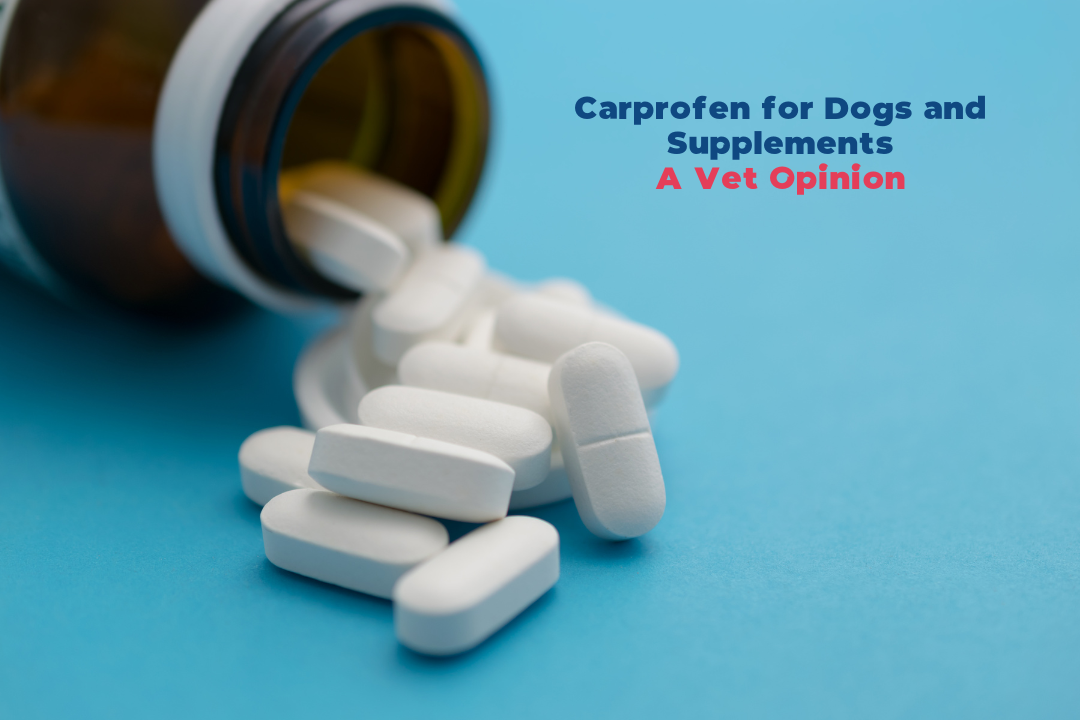No Products in the Cart
Carprofen for Dogs and Supplements - Vet Opinion

As pet owners, it's important to be aware of the signs of pain in our furry companions and to seek veterinary care promptly when necessary. One of the most common ways that veterinarians manage pain in dogs is through the use of nonsteroidal anti-inflammatory drugs (NSAIDs). One such medication that is commonly prescribed for dogs is carprofen.
What is Carprofen?
Carprofen is a non-steroidal anti-inflammatory drug (NSAID) that works by inhibiting the production of prostaglandins, which are responsible for causing pain and inflammation. Unlike cox-2 selective NSAIDs such as deracoxib and firocoxib, carprofen is a non-selective NSAID, meaning that it inhibits both the cox-1 and cox-2 enzymes.

Is Carprofen Good for Dogs?
Carprofen is commonly used to manage pain and inflammation in dogs. It is especially effective in treating arthritis, a condition that causes joint pain and inflammation. Carprofen can also be used to manage pain associated with other conditions, such as post-operative pain, soft tissue injuries, and dental procedures.
Also Read: Is Turmeric (Curcumin) Helping Dogs With Osteoarthritis?
It is important to note that carprofen should only be given under the guidance of a veterinarian, and the dosage and duration of treatment should be carefully monitored.
What are the Side Effects of Carprofen for Dogs?
While carprofen can be effective in managing pain and inflammation, it can also have potential side effects.
Some of the most common side effects of carprofen include gastrointestinal upset, including vomiting, diarrhea, and decreased appetite.
Other potential side effects include liver and kidney damage, and bleeding disorders. It is important to monitor your dog for any signs of side effects while on carprofen, and to seek veterinary care if any side effects are observed.
Also Read: Chondroitin for Dogs - 5 Things You Need To Know - Vet’s Expert Advice
What is Carprofen dosage?
The recommended dose for carprofen is typically around 2 mg per pound of body weight per day, which can be given as a single daily dose of 2mg/lb or divided into two doses (morning and evening) of approximately 1 mg/lb.
However, it is important to consult with your veterinarian before administering carprofen to your dog as the dosage may vary depending on your dog's individual condition and other factors.
Your veterinarian will be able to determine the appropriate dose and duration of treatment for your dog to ensure safe and effective use of carprofen.

What are Carprofen Alternatives?
While carprofen is a commonly used NSAID for managing pain and inflammation in dogs, there are other options available.
Some of the other commonly used NSAIDs in veterinary medicine include meloxicam, grapiprant, firocoxib, deracoxib, and robenacoxib. It's important to note that each of these medications has its own unique benefits and potential side effects, and the choice of NSAID should be based on the individual needs of each patient and made by a veterinarian.
Also Read: Is Your Dog Prone to Elbow Dysplasia? Symptoms and Best Treatments
Is glucosamine a natural alternative to carprofen?
One supplement that has been studied in relation to joint health in dogs is glucosamine. While some early research suggested that glucosamine may be helpful in managing arthritis symptoms, more recent studies have failed to demonstrate significant benefits.
Therefore, while glucosamine may be a relatively safe supplement to try in some cases, it should not be relied upon as the sole treatment for arthritis.
Is UC-II collagen an alternative to Carprofen?
Another supplement that has shown promise in managing arthritis symptoms in dogs is UC-II, a type of collagen.
In a study conducted by Stabile and colleagues, dogs with mild to moderate arthritis were treated with either robenacoxib or UC-II for 30 days. The researchers found that both treatments were equally effective in reducing pain and improving mobility.


Although UC-II cannot replace carprofen as a prescription medication, it may be a potential solution worth considering for dogs that have difficulty tolerating or responding to traditional NSAIDs like carprofen. Further research is needed to confirm the efficacy of UC-II, but it may provide a natural alternative option for managing pain and inflammation in dogs with mild to moderate arthritis.
However, it's important to always consult with a veterinarian before starting any new supplement or medication for your pet.
FAQ
Can joint supplements be used alongside Carprofen?
Yes, joint supplements can be safely used with Carprofen. In fact, combining a supplement like Jope with Carprofen may help support long-term joint health while managing discomfort. Jope’s UC-II® collagen works differently from NSAIDs, helping support joint function. Always check with your veterinarian for your dog's specific needs.















Leave a comment